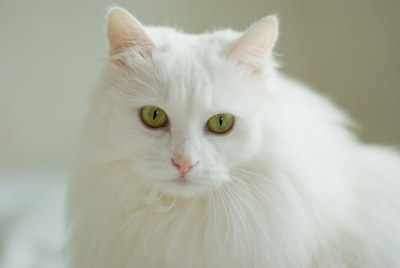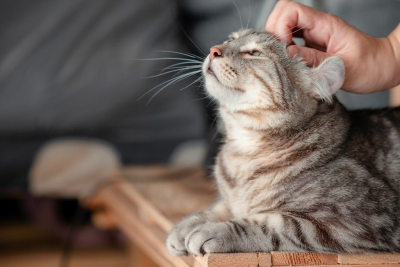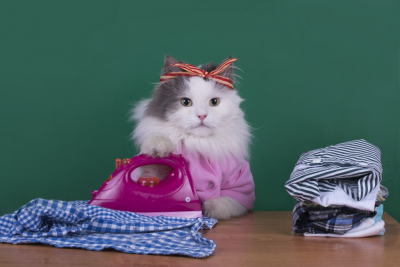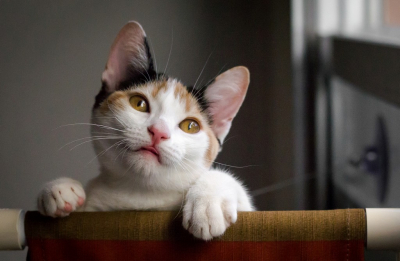Cats come in all shapes and sizes, but maintaining a healthy weight is one of the best ways to help them live a longer, happier life. Extra pounds can lead to serious health issues like diabetes, arthritis, and heart disease. On the other hand, being underweight can point to hidden problems such as parasites, dental disease, or other medical conditions.
Many pet owners don’t realize their cat may be overweight or underweight until a vet brings it up. That’s why it’s important to know what a healthy weight looks like, how to check it at home, and what to do if there’s a problem. In this guide, we’ll break it down in simple terms—what to watch for, how to feed your cat the right amount, and when to talk to your vet.
Your cat depends on you. With the right steps, you can help them stay fit and feel good. Let’s get started.
The World’s Heaviest Cat
Talk about a fat cat– the Guinness Book of World Records identifies the heaviest cat as having weighed between 39.6 and 46.5 pounds, depending on which records you check and which information you source. That’s because, technically, Guinness suspended the use of weight in measuring the largest cat and changed the criteria to height and length, instead. It was a concern that people were overfeeding their pets deliberately in an attempt to earn the title.
Most cats aren’t going to weigh more than 20 pounds. Again, however, this is where you’ll need to have them evaluated by a vet. Some cats, no matter how healthy their diet, will just be big cats. Others might gain weight easily, while others will remain small or skinny, no matter how much they eat. It’s all about breeds and genetics, just like it is with people.
Since you’re likely not competing for the title of the world’s heaviest cat (due to the fact that it no longer exists, not to mention the unhealthy factor), let’s talk about how you can help keep your cat in great shape, no matter how lazy he or she might be.
Why Your Cat’s Weight Matters
Your cat’s weight affects nearly every part of its body. If your cat weighs too much, it puts extra strain on the joints and heart. Too little weight can mean your cat isn’t getting enough nutrients. Either way, it leads to health problems in the long run.
- Healthy weight helps with:
- Mobility and energy
- Proper digestion
- Strong immune system
- Longer lifespan
It’s not just about feeding less or more—it’s about feeding right and watching behavior over time.
What Is a Healthy Weight for a Cat?
Most adult cats should weigh 8 to 10 pounds. But this depends on breed, age, and body type. A Maine Coon can weigh 18 pounds and be healthy, while a Siamese may be delicate at 7 pounds.
Instead of relying only on numbers, check your cat’s Body Condition Score (BCS). Veterinarians use this scale to rate body shape, ranging from 1 (too thin) to 9 (obese), with five being considered ideal. Here’s what to look for:
- Ribs: You should be able to feel—but not see—the ribs.
- Waist: When viewed from above, there should be a visible waistline behind the ribs.
- Tummy: From the side, the belly should tuck up, not hang down.
If your cat has a sagging stomach or a lack of visible waist, they may be overweight.
Signs Your Cat Is Overweight
It’s easy to miss slow weight gain. Many cat owners only notice when the vet points it out. Watch for:
- Round body shape
- Difficulty jumping or climbing
- Breathing heavily after light activity
- Sleeping more than usual
- Less interest in play
Extra weight builds over time. Even a few ounces matter when your cat is only supposed to weigh 9 or 10 pounds.
Signs Your Cat Is Underweight
Some cats lose weight as they age, particularly if they have underlying health issues. Warning signs include:
- Ribs, spine, or hip bones are easy to see
- Loss of muscle around shoulders or back legs
- Low energy
- Poor coat condition
If your cat eats normally but keeps losing weight, it could mean something serious like kidney disease, thyroid issues, or cancer. Don’t wait—get them checked.
Common Causes of Weight Gain in Cats
Free-feeding, or leaving food out all day, often leads to overeating. Indoor cats also burn fewer calories than outdoor ones. Here are some common reasons cats gain too much weight:
- Too many high-calorie treats
- Lack of exercise
- Spaying or neutering (this changes metabolism)
- Overfeeding dry food (it’s dense in calories)
- Eating out of boredom
Weight gain rarely happens from one cause alone—it’s often a mix of habits.
Why Some Cats Stay Too Skinny
Not all cats eat well, and some may burn more calories due to fast metabolism or illness. Common causes of weight loss or low weight:
- Dental pain (makes chewing hard)
- Worms or parasites
- Stress or anxiety
- Chronic disease (like diabetes or hyperthyroidism)
- Poor-quality food
If your cat is thin and doesn’t seem to eat enough, it’s time for a full check-up.
How to Help Your Cat Reach a Healthy Weight
1. Switch to Portion Feeding
Stop leaving food out all day. Instead, measure each meal. Most adult cats require 180 to 220 calories per day, but be sure to check the label on your food or consult your veterinarian.
Feed:
- Twice a day for adults
- Three times for kittens
This helps you control how much they eat and avoid mindless snacking.
2. Choose the Right Food
Pick food based on your cat’s life stage and needs. Overweight cats may need low-calorie or high-fiber food. Underweight cats may need more protein or a calorie-dense formula.
Don’t just switch brands without reading labels. Look at:
- Protein content
- Fat percentage
- Calories per cup
Avoid fillers like corn and wheat in the first few ingredients.
3. Cut Back on Treats
Treats should be no more than 10% of daily calories. Many owners give too many without counting.
Try:
- Freeze-dried meat treats
- Catnip toys as rewards
- Treat-dispensing puzzle toys
These options offer fun without adding extra calories.
4. Add Playtime
Exercise burns calories and builds muscle. Indoor cats need 10–20 minutes of play each day.
Use:
- Wand toys
- Laser pointers
- Puzzle feeders
- Climbing trees or shelves
Rotate toys often to keep things exciting.
5. Weigh Your Cat Monthly
Use a home scale (hold them, then subtract your weight) or a pet scale. Track the weight once a month. Weight changes slowly. Don’t expect fast results. Healthy weight loss is about 1% of body weight per week. So, a 12-pound cat should only lose around 2 ounces per week.
When to See the Vet
Call your vet if:
- Your cat’s weight changes fast
- They stop eating or have diarrhea
- You see signs of pain or behavior shifts
- You’re not sure how much to feed
Your vet may do bloodwork or check for issues like diabetes, kidney disease, or hyperthyroidism. They can also help you set a safe plan for weight loss or gain.
Do Breed and Age Matter?
Yes. Breed and age both affect your cat’s ideal weight.
- Seniors (over 10 years) often lose weight. Regular check-ups matter more here.
- Kittens grow rapidly and require more calories, but their bodies should still be lean and active.
- Large breeds, such as Maine Coons or Ragdolls, will weigh more, but they should still have a defined waist and tuck.
Always compare your cat’s shape to their breed standard if known. If not, rely on the Body Condition Score.
Indoor vs. Outdoor Cats
Indoor cats move less and usually gain weight faster, especially if they’re bored. They also get fewer chances to burn calories hunting or climbing. Outdoor cats are usually leaner due to high activity, but they face risks like parasites and injury. If your indoor cat is gaining weight, consider increasing playtime and controlling portions more closely.
When to Act
If you feel like your cat is looking a bit on the chubby side, you shouldn’t panic. Just like people, cats will experience occasional weight fluctuations throughout their life. However, if it appears to be increasing or becomes problematic, you should consult your veterinarian right away. In most cases, an extra pound or two won’t be that big of a deal, but it’s better to get a professional’s word for it.
Study up on cat nutrition and keep the information in this guide in mind to help you give your cat the best diet and other tools to maintain a healthy weight.





